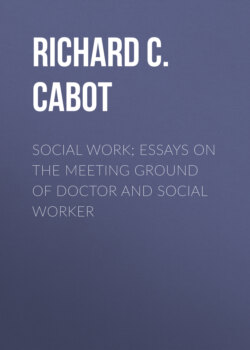Читать книгу Social Work; Essays on the Meeting Ground of Doctor and Social Worker - Richard C. Cabot - Страница 14
На сайте Литреса книга снята с продажи.
Hotbeds of industrial disease
ОглавлениеTable of Contents
Commoner and not less important than the contagious diseases that I have just mentioned are industrial diseases, or diseases aggravated by the conditions of industry. A physician may serve for many months in a dispensary without seeing a case of smallpox, of trichiniasis, or of typhoid fever, or feeling it his duty to set in motion the forces that I have just mentioned for rooting out the sources of contagion and preventing their further spread. But he cannot serve a month in any well-attended dispensary without seeing cases of industrial disease in the narrow sense, such as lead poisoning, or of independent disease aggravated by the conditions of industry, such as the functional neuroses of cigar-makers or of telephone operators. With such diseases, as with the infectious and contagious diseases, the presence of one case in the clinic should lead straight to the inference that there are others elsewhere, out of sight but no less important from the point of view of public good. This conclusion should lead in turn to the search through a social worker for the cases of disease which do not present themselves to any physician, which may be totally unknown even to the patient himself, yet which are important to the health of the nation.
Difficult though this field of industrial disease has shown itself to be, difficult though it is to separate out that portion of the patients' complaints which can justly be referred to the conditions of his work, and to distinguish it from the portions which are due to the way he lives, to his inheritance, to his habits or to diseases like tuberculosis and syphilis which may have been acquired without any connection with his work,—nevertheless we must try to disentangle and to recognize the elements in this knotty problem. And we can hardly fail to see that the social worker is an essential and logical assistant in the processes of investigation which we must carry out. If we can ever unravel the tangled skein of causes and effects whereby the hours of work, the strain of work, the patients' heredity and his home conditions, all combine to produce the symptoms of disease, it will be through such intimate, prolonged, detailed studies as the social worker can carry out, especially if she becomes a friend of the family. The doctor in his hours of consultation at the dispensary certainly can never do it. The official agent of the Board of Health, perhaps feared, certainly not a natural confidant for the family, may easily miss the truth which the social worker unearths, provided always she succeeds in differentiating herself altogether from the impersonal and professional investigator, and gradually becomes in the mind of the family and in truth their friend.
I said above that the social worker should try to find out what disease, how much disease, and why this disease is present. The answers to these three questions cannot be kept separate. If one knows how much importance to attribute to a given symptom and whether it is as bad as it seems or worse than it seems in the dispensary interview, one may be steered straight to a correct diagnosis. To know how much disease may thus mean knowing what disease is present. Furthermore, the understanding of these questions, even though it be only partial and unsatisfactory, leads us a considerable distance towards understanding why the disease has arisen. The search for sources for contagion is an example of a search for a why in disease. The search for psychical factors—groundless fears, misleading newspaper advertisements, distracting rumors—all this is also a search for the cause as well as for the nature of disease.
The social worker's investigations into the cause of disease may perhaps be still further exemplified. I once sent a social worker to my patient's home with the request that she try to find out what I had failed to find out, namely, why a young girl could not sleep. Physical examination of the girl had revealed no cause; the exploration of such parts of her mind as she would reveal to me had thrown no light upon the trouble. I was at a loss and asked for help through the more intimate knowledge of the patient sometimes to be gained through a social worker's studies. Such a search might easily have been fruitless—it often has been fruitless in my own experience. But in this case it was almost comically swift in reaching its goal. The visitor found that this girl was sleeping with two other girls of about her own age, in a bed hardly more than a metre wide. It needed only that she should acquire a separate bed for herself, which she was able to do without any financial assistance. She then regained her power to sleep. How often have such cases been treated with drugs or perhaps with more complicated physio-therapeutic or psycho-therapeutic procedures, when some simple fact like the size of the bed, the temperature of the sleeping-room, or the mental activities of the evening immediately preceding bedtime, are really responsible for the whole trouble.
